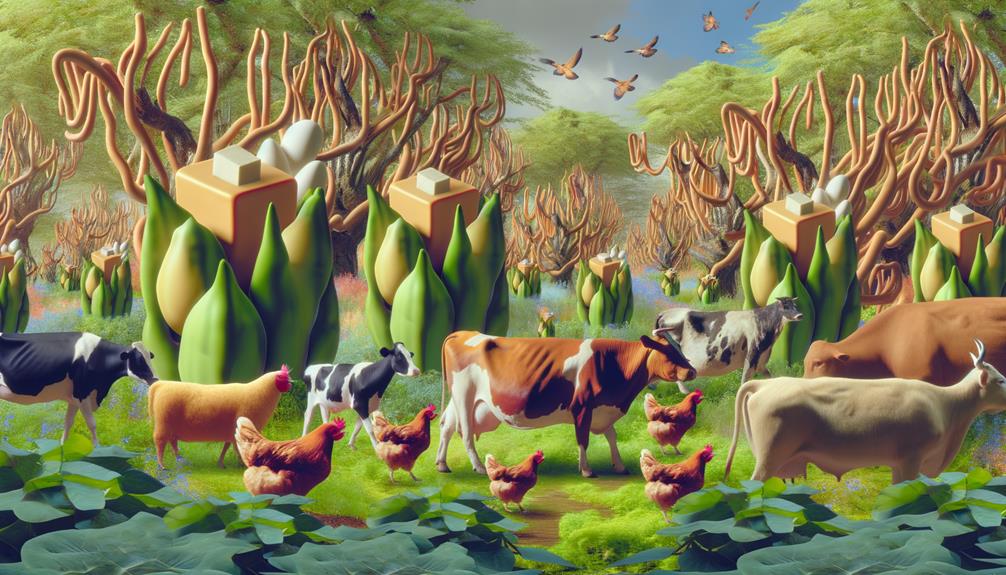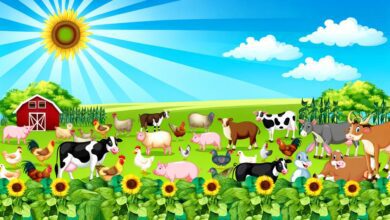As you wield your modern-day shopping cart like a valiant knight of yore, you’re not just picking out your weekly groceries; you’re making choices that echo through the annals of animal welfare. In every plant-based sausage, dairy-free cheese, and egg-free mayonnaise, there’s a silent nod to the countless creatures whose plights are often unseen behind the curtain of industrial farming. By choosing these vegan substitutes, you’re part of a compassionate crusade that challenges the status quo, offering a glimpse into a future where the clucking and crowing on farms signal contentment rather than distress. Your plate becomes a powerful statement, a cultural shift away from the acceptance of animal suffering as a necessary evil. And while you’re aware that the journey is far from over, you can’t help but wonder how deep the rabbit hole of ethical consumption goes and what other transformations await just around the corner.
Key Takeaways
- Vegan substitutes provide compassionate choices that align with concerns for animal welfare and dietary preferences.
- Choosing vegan substitutes reduces the demand for animal products and supports advocacy efforts for animal welfare.
- Vegan substitutes such as tofu, nut milks, and plant-based ingredients offer humane alternatives to meat, dairy, and other animal-derived products.
- Ethical consumer choices, such as opting for humanely farmed meat or supporting local farmers practicing sustainable farming, can also champion animal welfare.
Understanding Vegan Substitutes
Exploring vegan substitutes offers you compassionate choices that align with your concern for animal welfare and your dietary preferences. By choosing plant-based food, you take a stand against factory farming and the associated animal suffering. You’re not alone in this journey; animal rights activists have long advocated for the rights of farmed animals, campaigning against the cruelty that often accompanies the production of meat and dairy products.
Food technology has advanced to create a variety of vegan options that cater to your tastes without compromising on nutrition or flavor. These innovations allow you to enjoy meals that are familiar yet free from animal-derived ingredients. You’re part of a growing movement that seeks to redefine our relationship with food, one that respects the dignity of all living beings.
As you continue to navigate your dietary choices, remember that veganism isn’t just about what you eat—it extends to vegan fashion and other lifestyle aspects, offering alternatives that prevent animal exploitation. Your decision to abstain from eating meat and explore vegan substitutes is a powerful expression of your values, contributing to a kinder, more ethical world.
Impact on Animal Lives
As you embrace plant-based alternatives, you’re not only broadening your culinary horizons but also directly contributing to the reduction of animal suffering in food production. Choosing these compassionate options, it’s clear you’re someone who deeply values the well-being of all sentient beings.
Here’s how your choices impact animal lives:
- Fewer Animals in Farming: By opting for vegan substitutes, the demand for animal products decreases, leading to fewer animals being bred and raised in often crowded and inhumane conditions.
- Promotion of Humane Farming: As more people seek to protect animal welfare, farmers may adopt more ethical practices, such as free-range environments, which considerably improve the quality of life for these animals.
- Decreased Egg and Dairy Farm Exploitation: When you select almond milk over cow’s milk, or a plant-based egg alternative, you help reduce the strain on dairy cows and egg-laying hens, who are frequently subjected to stressful, high-production demands.
- Support for Farm Animal Welfare Advocacy: Your choice bolsters advocacy efforts, raising awareness about the plight of animals in traditional animal farming and pushing for more humane legislation and practices.
Every meal you have is an opportunity to stand up for animal welfare and make a statement: sentient beings deserve our respect and compassion.
Substitutes in Everyday Meals
Integrating vegan substitutes into your daily meals can effortlessly transform the traditional dishes you love into expressions of compassion for animals and the environment. You may often find yourself at a crossroads in the grocery store, deciding between animal products and their plant-based alternatives. It’s here where your choices can speak volumes about your commitment to animal welfare.
By choosing tofu, tempeh, or seitan over meat, you’re not just opting for a humane meal—you’re also exploring new textures and flavors that honor your culinary traditions while fostering a kinder world. Nut milks like almond, soy, and oat can seamlessly replace dairy in your morning latte or cereal, allowing you to enjoy the comfort of familiar foods without supporting the dairy industry.
The journey towards veganism isn’t about sacrificing the joy of eating; it’s about reimagining it. Aquafaba whips into meringues, flaxseed binds like eggs, and chia seeds can thicken to replace farmed fish in recipes. When you choose to eat meat that’s humanely farmed or better yet, not to eat meat at all, you create a ripple effect around animal welfare. These food products are more than just ingredients; they’re symbols of your benevolence and catalysts for change.
Ethical Consumer Choices
While considering vegan substitutes as a powerful statement for animal welfare, it’s equally important to weigh the ethical implications of other dietary choices you might encounter. You’re not just looking at the ethical label on a product; you’re partaking in a movement towards Animal Liberation, advocating for higher animal welfare standards across the board.
Here are different options that you, as an ethical consumer, can explore:
- Humanely Farmed Meat: Opt for products from farms with transparent animal welfare policies, ensuring land animals are treated with respect.
- Wild-Caught Fish: Seek out seafood caught using methods that minimize environmental impact and prioritize animal welfare.
- Dairy Alternatives: If you’re not ready to stop buying dairy, look for products from sources that uphold strict animal welfare standards.
- Local Produce: Support local farmers who practice sustainable farming, reducing the food miles and promoting a kinder agricultural system.
When it comes to animal rights, every choice you make sends a message. By choosing vegan substitutes or other ethical consumer choices, you’re contributing to a future where animal welfare is not an afterthought but a given standard. Your diet is your statement, and with each compassionate choice, you’re helping reshape food industries worldwide.
Advocating Through Diet Choices
Choosing what you eat is a powerful form of advocacy, directly influencing the demand for products that align with your ethical values regarding animal welfare. When you make food choices that are compassionate, you’re sending a clear message to big food industries. Opting for plant-based alternatives not only supports the well-being of animals but also contributes to mitigating the climate crisis—an important part of the larger puzzle.
As you explore your diet, you might find that something that’s sustainable and ethical is within reach. While veganism might be challenging, know that each plant-based meal you prepare is a step towards a future that would end the suffering of countless animals, including dairy cows confined in industrialised farming.
If you find a vegan diet isn’t feasible, consider alternatives like humanely farmed meat, where animals are treated with more respect, or wild-caught fish, while being mindful of their impact on marine ecosystems. Remember, every time you sit down to eat, you have the opportunity to make a difference. Your plate is not just a meal; it’s a statement about the world you wish to create.
Frequently Asked Questions
Do You Have to Be Vegan to Be an Animal Rights Activist?
You don’t have to be vegan to advocate for animal rights. Your lifestyle choices, including ethical consumption and welfare advocacy, can reflect your animal empathy and commitment to compassionate living and cruelty-free options.
How Does Veganism Affect Animal Welfare?
By choosing veganism, you’re making compassionate choices that promote cruelty-free living and advocating for sentient beings’ rights while connecting dietary impacts to environmental health.
What Are the Three Arguments That Support Ethical Veganism?
You’re exploring ethical veganism, which encompasses compassionate choices, environmental ethics, and health considerations. It’s about moral obligation, respecting sentience, sustainable living, rejecting factory farming, ethical consumption, and advocating a cruelty-free, plant-based lifestyle.
Does PETA Support Vegans?
Yes, PETA ardently supports your journey towards compassionate choices, endorsing a cruelty-free lifestyle that emphasizes the health benefits and environmental footprint reduction of conscious eating, through their dietary advocacy for plant-based impact and animal liberation.







